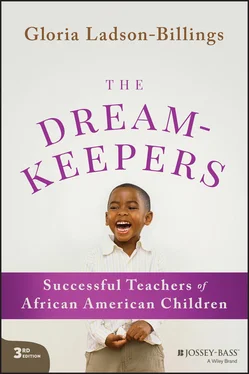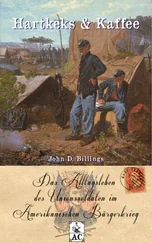However, again, the book is not a prescription. It does not contain lists of things to do to achieve effective teaching for African American students. As tempting as it was for me to do just that, my work on this book has convinced me that doing so would be professionally dishonest. I am committed to the belief that just as we expect children to extrapolate larger life lessons from the stories we tell them, we, as adults, can make our own sense of these teachers’ stories about themselves and their teaching.
I have written this book not to offer a solution to problems in the education of African Americans but to offer an opportunity to make those problems central to the debate about education in general. In accordance with current public policy thinking, this book contends that the way a problem is defined frames the universe of reasonable public actions. Given our limited ability to address every problem that confronts the society, problem formulation takes on added proportions. Thus a specific problem, such as education, cannot stand alone; rather, it must be linked to broader issues like national defense, economic competitiveness, or crime. In this book, I attempt to reformulate what has been thought of as the problem of African American schooling into the promise of successful practice and the problem of our inability to consider how we might learn from that success.
This book discusses the notion of culturally relevant teaching and its inherent conceptions of the teacher and others; of classroom social interactions; of literacy and mathematics teaching; and of knowledge itself. Further, the book examines the implications of culturally relevant teaching for African American student education and teacher education.
Chapter One, in an attempt to rethink teaching and learning for African Americans, asks the question, “Is there a case for separate schools?” Far from suggesting a return to racial segregation, the chapter points to the growing disaffection of African Americans with the kind of education their children receive today in the public schools. Placed in a historical context, the question raises additional questions about teacher preparation.
Chapter Twodiscusses the growing educational and anthropological literature on ways in which school can be made more compatible with the students’ cultural backgrounds. The chapter identifies a lack in the literature on the experiences of African American students specifically, and offers culturally relevant teaching as a way to address this gap. The chapter also compares assimilationist, or traditional, teaching practices with culturally relevant teaching practices.
Chapter Threediscusses a critical aspect of culturally relevant teaching: the teachers’ conceptions of themselves and others. Vignettes and interviews with this group of successful teachers of African American students illustrate how they see themselves and their students.
Chapter Fourdiscusses a second critical aspect of culturally relevant teaching: the manner in which classroom social interactions are structured. Once again, vignettes and interview data illustrate the pertinent points.
Chapter Fivediscusses the third critical aspect of culturally relevant teaching: the teachers’ conception of knowledge. The chapter provides examples of how this kind of teaching practice helps both teachers and students construct knowledge and move beyond the state- and district-required curricula to achieve academic and cultural excellence.
Chapter Sixfocuses on three of the teachers in the study and their teaching of elementary literacy and mathematics programs. The focus on literacy contrasts two different instructional approaches and materials that yield similar results: a classroom of literate students. The chapter discusses the ways in which the teachers’ use of culturally relevant teaching transcends the material and instructional strategy. The focus on mathematics contrasts the practice of a culturally relevant teacher with that of a novice who works in an upper-middle-class white school.
Chapter Sevenattempts to peek into the future. It examines the prospects for improving the academic performance and the school experiences of African American students. It looks at current practice in teacher education, established school and community programs that have a focus on African American learners, and some experimental programs.
Two appendixes at the close of the book address methodological and contextual issues. They are included to help colleagues think about ways to both replicate and improve upon my research. Indeed, this entire effort represents not a conclusion but a starting point from which the educational needs of African American students can begin to be addressed.
Mere words do little to express my gratitude for the invaluable assistance I received in conceiving, developing, and writing this book. My colleagues, Mary E. Gomez, Carl A. Grant, Joyce E. King, B. Robert Tabachnick, and William H. Tate have provided me with invaluable feedback and encouragement. The National Academy of Education postdoctoral fellowship program, administered through the Spencer Foundation, gave me the resources and the opportunity to carry out the research upon which this book is based. The spiritual guidance of the Reverend and Mrs. Emil M. Thomas kept me from feeling discouraged and defeated during a period of serious illness. The teachers, parents, students, and community in which I did my research gave generously of their time and energy to make this project happen. And my family—my husband, Charles, and my children, Jessica and Kevin—gave me the time and the support to make this book a reality.
In the final analysis, however, I assume full responsibility for the contents of this book. The ideas and opinions expressed and the mistakes made are mine alone.
Madison, Wisconsin Gloria Ladson-Billings
Gloria Ladson-Billings is the Kellner Family Professor of Urban Education in the Department of Curriculum and Instruction and Faculty Affiliate in the Department of Educational Policy Studies at the University of Wisconsin–Madison. She is the 2005–2006 president of the American Educational Research Association. Ladson-Billings’ research examines the pedagogical practices of teachers who are successful with African American students. She also investigates Critical Race Theory applications to education.
Ladson-Billings is the author of the critically acclaimed books, The Dreamkeepers: Successful Teachers of African American Children, Crossing over to Canaan: The Journey of New Teachers in Diverse Classrooms, and Beyond the Big House: African American Educators on Teacher Education, and more than 50 journal articles and book chapters. She is the former editor of the American Educational Research Journal and a member of several editorial boards. Her work has won numerous scholarly awards, including the H. I. Romnes Faculty Fellowship, the Spencer Post-doctoral Fellowship, and the Palmer O. Johnson outstanding research award. In 2002 she was awarded an honorary doctorate from Umeå University, Umeå, Sweden. During the 2003–2004 academic year she was a fellow at the Center for Advanced Study in the Behavioral Sciences, Stanford, California. In fall 2004 she received the George and Louise Spindler Award from the Council on Anthropology and Education for significant and ongoing contributions to the field of educational anthropology. In spring 2005 she was elected to the National Academy of Education and the National Society for the Study of Education. She is a 2008 recipient of the state of Wisconsin’s Martin Luther King Jr. Heritage Award and the Teachers College, Columbia University, 2008 Distinguished Service Medal. During the 2008–2009 year she was named the Helen LeBaron Hilton Distinguished Chair of the Iowa State University College of Human Sciences.
Читать дальше












